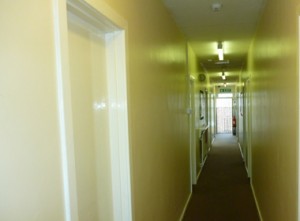A few weeks ago Stephen Small, G4S managing director for Immigration and Borders, and Jeremy Stafford, Serco CEO for the UK and Europe were forced to defend their record before the Home Affairs Committee into the asylum system.
You can read a full report by John Grayson* on the Home Affairs Committee’s 25 June asylum hearing on Open Democracy. Below he continues his analysis of the involvement of private companies in the provision of housing for asylum seekers.
Small and Stafford faced questioning from MPs briefed by campaigners about the many problems of appalling housing conditions and shabby housing management exposed over recent months, particularly in G4S contract areas in the Midlands, East of England, Yorkshire and the North East, where G4S houses 11,000 asylum seekers under the Home Office’s COMPASS contract.
It was no doubt a bonus for COMPASS landlords Serco and G4S when they realised that dispersed asylum-seeker tenants were stripped of all conventional tenants’ rights in 1999, and can be bullied and abused by the Home Office in a ‘monstrous’ poor law system of asylum support[1] and ‘no choice’ asylum housing. The Home Office clearly wanted a housing regime in its COMPASS contracts which would deter future asylum seekers from coming to the UK; in its first year G4S has certainly provided this.
G4S was handed a ‘massive contract … the second biggest contract that the Home Office gives out-to big companies’ for asylum housing.[2] In his evidence to the Committee Stephen Small valued the G4S part of the national contract as worth between £150 and £200 million over five years. However, other evidence to the committee from the Joseph Rowntree Foundation (JRF), suggested (citing a Home Office letter of 26 April 2013) that the potential size of the national contract could in fact be £1.7 billion over five years.
Subcontracting with public money
Serco’s evidence to the Committee revealed that in the North West it directly manages homes for asylum seekers through what the chair Keith Vaz described as ‘around twenty subcontractors from Happy Homes Ltd to First Choice Homes and Cosmopolitan Housing’. Jeremy Stafford of Serco claimed this apparent recipe for housing management disaster was in fact a proven way of outsourcing and privatisation. It is ‘a very effective model and we do that in a number of the services we deliver’, he said. This confidence in the ‘new delivery model’ of privatisation in the COMPASS contracts seems somewhat misplaced in the context of the JRF evidence. For it reveals that Reliance, the other security company with asylum housing contracts in London, the South West and Wales, sold on the privatised contracts after only two months to Capita and Clearel. The new provider, Clearel, does not apparently even fulfil the requirements of the contracts as tendered.
Making money out of vulnerable tenants
In West Yorkshire and the North East, G4S sub-contractors Cascade and Jomast directly own hundreds of properties, which has enabled them to make substantial profits. Other G4S subcontractors like Mantel and Live Management who are not ‘asset rich’ in housing portfolios have simply left the contract (Mantel), or been reduced to the status of letting agents for G4S (Live Management).

Jomast Developments, which subcontracts from G4S for the whole of the North East, is a large property development company, and like many property and private housing companies is able to use the guaranteed flow of rental income for asylum housing as collateral to guarantee loans for further projects. The fact that this rental income is taxpayers’ money meant to support vulnerable asylum seekers and their families seems to be irrelevant.
Jomast owns and manages a mother-and-baby hostel in Stockton with thirty women and thirty-eight children of less than eighteen months, which residents describe as ‘living in cells’ in unhealthy, often dirty conditions.[3] If G4S pays Jomast the same rate as Serco claimed at the Committee to pay its main subcontractor Orchard and Simpson, then Jomast probably pockets around £22,000 a month of taxpayers’ money for the misery of women in that hostel in receipt of asylum support. Serco evidence claimed that the Home Office pays the company £11.71 for each single person in dispersed asylum housing each night, and £30.28 per night for each single asylum seeker in dispersal accommodation.
In West Yorkshire, Cascade has had an appalling record of allocating filthy, cockroach-infested properties, under the G4S contract. The Home Office suspended it from the contract from December 2012 till May this year. Despite this, Cascade staff continued to enter properties unannounced and allegedly harassed asylum seeker tenants who spoke out about their conditions. Cascade has simply ignored parliamentary censure and inquiries so far.
Campaigners have exposed cases in Cascade housing which demonstrate this apparent defiance. Women asylum seekers who have complained publicly over the last year about the G4S contracts in Yorkshire and the North East have subsequently been harassed by male staff visiting unannounced. ‘Ruth’ and ‘Angela’ (not their real names) who spoke out about the terrible conditions in their Leeds housing were then relentlessly visited by G4S/Cascade staff. In a Children’s Society parliamentary panel report on asylum support for children and young people published in January 2013, Sarah Teather MP reported that:[4]
‘Almost every family told us that housing contractors routinely enter properties without knocking … It causes terror for children, and … They are treated as luggage rather than people who deserve some dignity and respect. The Government must get to grips with that with housing contractors.’
Three months later, in Leeds ‘Angela’ was still being harassed and her home entered without her permission by Cascade staff.
Sources within Cascade suggest that the subcontractor will continue to ignore censure, because G4S has given it assurances of its and the Home Office’s continuing support.
Government support for G4S
At the Committee hearing, Stephen Small boasted about the support of the Home Office for G4S’ continued management of contracts. This is not a new development; in Leeds on 14 February at its one and only disastrous ‘Roadshow’, G4S encountered a room full of hostile local authority representatives, stakeholders and asylum rights organisations, and three Home Office civil servants. One of the civil servants rose at the end of the meeting and enthusiastically thanked G4S for ‘engaging’ with people in this way and gave their public support to the company and its management of the contract.
As recently as 19 June, after all the exposés of the chaos in the G4S contracts and the misery of asylum seekers and their families in Yorkshire and the North East; conditions described by shadow immigration minister Chris Bryant as ‘hideous’, Mark Harper, the Coalition immigration minister, in a written answer to Labour MP Chris Ruane, a member of the Home Affairs Committee, placed the government squarely behind G4S: ‘G4S performance is satisfactory. Where shortfalls in performance have been identified the performance regime has been applied and improvement plans developed and implemented.’ Small specifically referenced these comments in his defiant appearance before the Home Affairs Committee.
This support is not perhaps surprising. G4S has the former Labour home secretary John (now Lord) Reid on its board  and actively lobbies in the House of Lords for the security industry[5]. G4S has also recruited first Adam Mynott a former BBC journalist to its PR team. In 2012, Adam Crozier, head of ITV and formerly CEO of the Football Association and Royal Mail, joined the board. Until June 2013 former Metropolitan Police commissioner Lord Condon was on the board (he is still a major shareholder).
and actively lobbies in the House of Lords for the security industry[5]. G4S has also recruited first Adam Mynott a former BBC journalist to its PR team. In 2012, Adam Crozier, head of ITV and formerly CEO of the Football Association and Royal Mail, joined the board. Until June 2013 former Metropolitan Police commissioner Lord Condon was on the board (he is still a major shareholder).
In his 2013 study of The Political Power of the Business Corporation,[6] Stephen Wilks argues that the impact that international corporations like G4S have ‘is not about participation in a political process, it is about dominating the political process and defining the structures of national and global politics’.
Currently G4S, supported by allies in all political parties, is under scrutiny in the Home Affairs Committee for its housing abuse of asylum seekers, as a result of a research and monitoring effort launched by asylum-seeker tenants alongside asylum rights organisations and academics. And the official scrutiny of G4S is not over. John Vine, Chief Inspector of Borders and Immigration, is scheduled to inspect the asylum system this summer and autumn (he has also been provided with a dossier of evidence on G4S asylum housing in Yorkshire and the North East.) A Serious Fraud Office inquiry has begun into the overcharging in tagging contracts[7] and the National Audit Office has just announced an investigation into the Home Office COMPASS housing contracts.[8]
The fightback
Asylum seekers interviewed say they fear G4S and their staff appearing at their doors and managing their housing, because of their experience in the G4S ‘detention estate’. The Yorkshire and North East campaigns on G4S asylum housing began around the simple statement by a Zimbabwean asylum-seeker tenant, ‘I do not want a prison guard as my landlord’.
Despite risks, harassment and eviction, asylum-seeker tenants have fought back and provided crucial evidence to expose G4S and its housing abuse. In Stockton on 19 March, asylum-seeker tenants and their supporters invaded a G4S/Jomast ‘consultative’ panel, demanding regular representation as of right. In Glasgow, campaigning asylum-seeker tenants have set up tenants and residents associations. Jeremy Stafford typically managed to present this development to the Home Affairs Committee as a Serco initiative: ‘With the many different types of services that we operate (we) have very well established service user groups, so we made sure there is an opportunity for people to raise issues’.
There is now a formidable alliance of MPs against G4S and in solidarity with asylum-seeker tenants, including Labour shadow immigration minister Chris Bryant, shadow culture minister Dan Jarvis, David Winnick, a respected member of the Home Affairs Committee, Mark Durkan, Jeremy Corbyn and Chris Ruane, a member of the Home Affairs Committee, who have spoken or asked questions in Parliament; and Alex Cunningham and Paul Blomfield who have lobbied the Home Affairs Committee.
Influential Labour backbench MPs like George Mudie in Leeds and Jeffery Robinson in Coventry have given local support to campaigning asylum-seeker tenants. The Lib Dem former minister Sarah Teather has systematically exposed the realities of the asylum ‘support’ system for women and children in her Children’s Society panel of MPs and her Westminster Hall debate on the panel’s report. Lib Dem MP Julian Huppert, another member of the Home Affairs Committee, has supported housing campaigners against G4S for over a year.
Despite the spin from G4S, Serco and their friends in high places, the first skirmishes in the Home Affairs Committee suggest that this is a battle which can be won. In solidarity with asylum-seeker tenants, we can get rid of G4S, Serco and Capita/Clearel, and switch taxpayers’ money for asylum housing back to local authorities, for them to coordinate housing associations and housing companies with decent housing, to provide real housing support for those waiting for their asylum claims to be determined.
Related links
Watch the evidence to the Home Affairs Committee here
Download the evidence to the Home Affairs Committee here (pdf file, 184kb)
Report of the Parliamentary Inquiry into Asylum Support for Children and Young People
South Yorkshire Migration and Asylum Action Group (SYMAAG)
Read an IRR News story: ‘G4S, Jomast Stockton hostel and the mother-and-baby-market’
Read an IRR News story: ‘Response to G4S: 900 asylum seekers face eviction in Yorkshire’
Read an IRR News story: ‘G4S and asylum seekers’ housing’
Read an IRR News story: ‘First they came for the asylum seeker …’
Read an IRR News story: ‘Lies, damned lies and racism’


It’s only because of the bravery of asylum tenants and the determination of campaigners like John that we have put these corporate bloodsuckers on the back foot.
Many of us campaigning on this issue have tried to build solidarity with asylum tenants on the basis that we all have a common interest in stopping the privatisation of asylum housing and social housing generally by the likes of G4S and Serco. It was on this basis that we have had support from a number of tenants and residents associations in the north of England.
In the Home Affairs Committee hearing Jeremy Stafford from Serco confirmed our view that the asylum housing contract was a loss-leader for them – a step to marketising and monetising social housing. Stafford explained that Serco was:
“Very focused on building an accommodation business . . . we felt that we could establish a very good platform that we felt was scalable . . . some of the services that we develop in the United Kingdom we then go and take to other geographies . . . For us, we felt accommodation management was an important development area.’”
In English, I think that means: “today, asylum housing in the UK: tomorrow, any housing around the world.”
The politics of asylum rights should be those of solidarity, not charity and pity.
And in Scotland where Serco tool
The contract from a charity Ypeople, they immediately subcontracted to a Scottish agent afterscooping up their profit from doing nothing. Ypeople had provided support. Community flats, a tenants association , Internet access, children’s play, cheap food…..and never evicted anyone even if the UKBA stopped paying the rent. The contracts were awarded despite no evidence of experience or quality of provision indeed got the Y that was the reason they lost it probably. And the lower bid is for lower wages which are made up by housing benefits, tax credits, childcare credits so we subsidise their profits
I am an Asylum Seeker and I am currently facing many problems with my property manager (Cascade) They come in property almost everyday without any prior notice the timings are usually after 8pm which is very frustrating specially if you have young childrens of school age. They failed to pay gas and electric bills and so by a court order British gas change meters. Now we have to call them 2-3 times before they come and top up 5-10 credit in meter
My daughter is now suffering because we hardly use gas heating they constantly putting pressure on us to reduce gas and electric bills. Currently we are using £3 / day .
Is there any department we can go to complain? We did called G4S but they are really not resolving anything.
Thanks for finally talking about >G4S and housing abuse of asylum seekers – the
truth emerges | Institute of Race Relations <Liked it!
I too, on behalf of a friend would like to know what avenues can be taken to make a complaint about the lack of respect and general substandard treatment of tenants. Does anyone have any ideas please? Thanks.
Hi
I’m a asylum seeker , I got house through G4S , I got lots of problems , about this house , because I’m living with 1 year old child . I’m every day complaining about my matters to housing manage (taheer -07885 948332) and G4S office , at the moment 1 month and 2 weeks gone already , still they didn’t sorted out my problems . Those all are really safty issues to my baby . I show this thing to our health visitor , she was confused and she told me this is really big safty issues and G4S BRAKING rules , and she strait away call thaheer . But still nothing happened . Pls if you can pay your attention to my matter .
Thanx
Kumarage